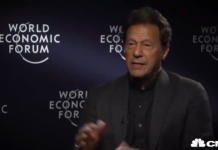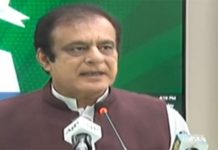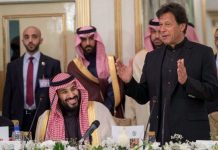Speakers at a live webinar while highlighting dangerous dimensions of the lingering
Kashmir conflict have observed that the ever-present threat of a nuclear war between India and Pakistan will continue to hover on the horizon unless both countries address the core issue of
Kashmir that happens to be the root cause of tension in the region.
The webinar convened by
Kashmir Institute of
International Relations (KIIR) in collaboration with World Muslim Congress on the sidelines of the 44th session of United Nations Human Rights Council titled “Emerging Conflict in South Asia Threat to
International peace and security” was addressed by noted British author, biographer and historian Victoria Schofield, Ambassador (retd) Arif Kamal, Ershad Mahmud, Brig (retd) Dr Saif Malik, Ahmed Qureshi and others, whereas, the event was moderated by the KIIR Executive Director Sardar Amjad Yousaf Khan.
Referring to the genesis of
Kashmir issue, the speake
rs pointed out that
Kashmir, which has now assumed a dangerous dimension, had been a subject of di
spute between India and Pakistan since the partition of the Indian subcontinent in 1947.
Terming
Kashmir conflict as the root cause of tension in the region they said that the long drawn conflict, which has consumed
Kashmiris’ three generations, has been a stumbling block in the way of peace, prosperity and stability in the region.
“It is because of the unresolved
Kashmir conflict that the two countries have never been able to be on good terms since 1947”, they said adding that the conflict has triggered two of the three major Indo-Pak wars in 1947 and 1965, and a limited war in 1999.
The violent face-off in Ladakh between India and Chinese military, they said, has added a new dimension to the
Kashmir conflict. “There is a wall of misunderstanding between the two countries”, they added.
The Indian government’s August 5th move they said has further endangered the security situation in the region. “Removing special status of Jammu and
Kashmir was an atrocious attack on the
Kashmiri’s national and territorial Identity”, the speakers said adding that the Modi led fascist regime was trying to colonize
Kashmir in the same pattern as Israel did in Palestine.
Redefinition of domicile rules they said was part of India’s nefarious design to convert Muslim majority state into a minority. They, however, observed that the international community has not appreciated what has happened recently in the restive region.
They said that the last few months have been the bloodiest months in the history of Jammu and
Kashmir. About the rising tide of violence in the region, they said, “Kashmiri peopl
e̵7;s lives are at risk, and particularly the women folk are always the first casualties to the atrocities”.
Regarding the restrictions on print and electronic media they said “Kashmiri media is facing the worst kind of censorship since the government of India introduced a new media policy for the region”. The speakers hailed international media outlets such as BBC and Aljazeera for giving a huge publicity to
Kashmir since August 5, 2019.
About the changing world scenario they said, “Since the last one year, countries who avoided talking about the
Kashmir issue have started to talk on this issue in their own congress to find stability in the region”
Highlighting the global community’s role in resolving the di
spute peacefully they said, “Only
International community can get both the countries to talk and solve the di
spute amicably”.






